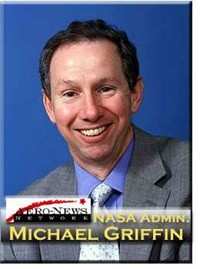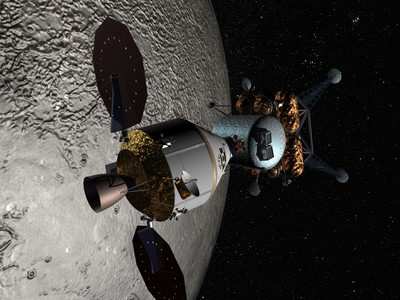Critics Say Agency Has 'Been There, Done That'
 It's somewhat ironic to
accuse a space agency of not reaching far enough towards the
stars... but that's exactly what critics of NASA's plans to return
to the moon are alleging.
It's somewhat ironic to
accuse a space agency of not reaching far enough towards the
stars... but that's exactly what critics of NASA's plans to return
to the moon are alleging.
And, frankly, NASA Administrator Michael Griffin is sick of
hearing them complain.
"I'm always intrigued by the idea that since we've spent a few
days on the moon that the place is now uninteresting for all future
time and that we should ignore it and head straight for Mars,"
Griffin told lawmakers Wednesday, reports Florida Today. The NASA
chief also dismissed criticism of NASA's plan from a conference of
scientists at Stanford University, as "foolish."
Griffin defended his agency's plans in a session before the
House Science and Technology Committee, regarding NASA's budget
request for fiscal year 2009. The panel is usually friendly
territory for the NASA chief... but Griffin found himself once
again defending the plan, to reach incrementally into the
heavens.
Some experts say NASA should instead focus on sending spacecraft
to asteroids -- or directly to Mars -- instead of visiting a place
astronauts have already been, and stopped visiting 35 years ago.
Griffin counters a cautious return to extraorbital space is called
for.
"I regard that as foolish, frankly," Griffin said of the group's
statements. "The moon is three days and a quarter-million miles
from home. When we return to the moon, we will have not been there
for 50 years."
Lawmakers also questioned the "mismatch" between President
Bush's call for a significant boost to America's presence in space,
"and the resources it's been given." Committee chairman Bart Gordon
termed the administration's outlook "a musical chairs approach to
science funding."
Last week, the White House proposed a $17.6 billion budget
request for NASA in fiscal year 2009. The request includes $300
million more than last year's authorization, but also a cut to the
space shuttle program -- and no money to support manned missions
after the shuttle is retired in 2010. NASA's next manned spacecraft
won't fly until 2015 at the earliest.
"After factoring in inflation, NASA's resources are shrinking in
real terms while the agency is charged with maintaining America's
preeminence as a spacefaring nation," said Florida Congressman Tom
Feeney, whose district includes the Kennedy Space Center.
Griffin countered the budget request is "sufficient" to support
NASA's programs. "Despite the demands of this once-in-a-generation
transition, this budget request provides an appropriate balance
between human space flight, Earth and space science, and
aeronautics research," he said.
The administrator also took steps to alleviate criticism of
NASA's current plan to rely on Russia to fill the spaceflight gap
once the shuttle is retired.. He vehemently opposes proposals
to continue shuttle missions past that date, as have been suggested by
some, to close that gap -- saying there simply isn't
enough money to go around.
"Delaying the space shuttle retirement does not solve that
problem, in fact, it exacerbates it," Griffin said. "Money spent
flying the shuttle after 2010 is not available for Ares and Orion,
which causes the gap between shuttle retirement and deployment of
new systems to grow and with it, the duration of dependence on
Russian
systems."

Got all that? Because Griffin really doesn't want to repeat
himself.
 ANN's Daily Aero-Linx (05.06.25)
ANN's Daily Aero-Linx (05.06.25) ANN's Daily Aero-Term (05.06.25): Ultrahigh Frequency (UHF)
ANN's Daily Aero-Term (05.06.25): Ultrahigh Frequency (UHF) ANN FAQ: Q&A 101
ANN FAQ: Q&A 101 Classic Aero-TV: Virtual Reality Painting--PPG Leverages Technology for Training
Classic Aero-TV: Virtual Reality Painting--PPG Leverages Technology for Training Airborne 05.02.25: Joby Crewed Milestone, Diamond Club, Canadian Pilot Insurance
Airborne 05.02.25: Joby Crewed Milestone, Diamond Club, Canadian Pilot Insurance




